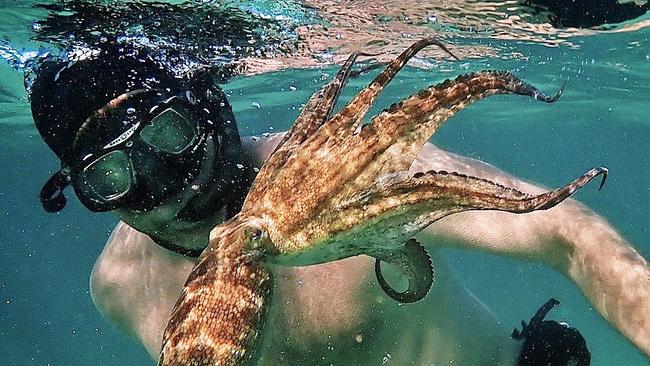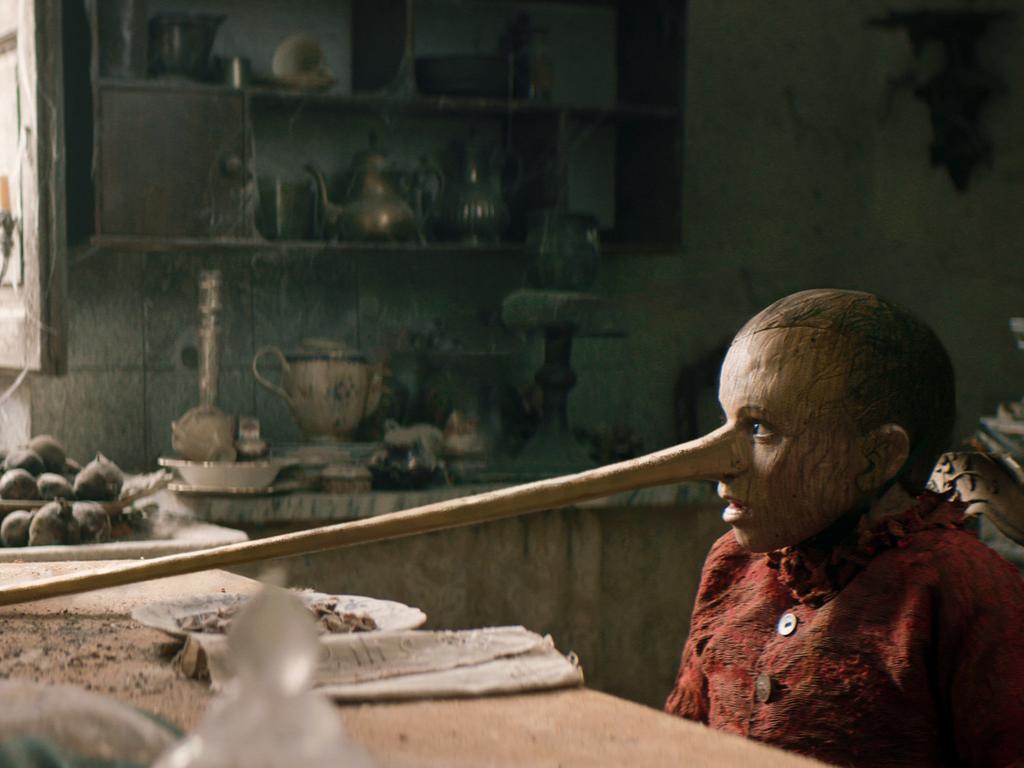
Dirt Music, based on Tim Winton’s 2002 novel, is a movie that asks lots of questions.
First, why cast an American-Scandinavian actor-model and a Scottish actress in the lead roles? Director Gregor Jordan has said using non-Australian actors was not his original plan, but would-be stars were deterred by the remoteness of the location in Winton’s home state of Western Australia.
The good news is that Garrett Hedlund and Kelly Macdonald are good in the roles and do the Australian accent well. When Lu Fox (Hedlund) first meets Georgie Jutland (Macdonald) she’s in the sea, swimming naked. When he says he thought she was a body, she replies with a smile and a line that would make Elle Macpherson proud: “I am a body.”
Second, why did it take so long for this novel, which won the Miles Franklin and was short-listed for the Booker, to make it to the screen?
The reason, I think, is that while Winton writes directly and beautifully about the landscape, his characters are often more interior than exterior. There is an abstract, unexplained nature to what they think and do, which is easier to show on the page than on the screen. It requires more actors, for starters, as we have to see what is in the character’s mind, not read about it.
Phillip Noyce (Rabbit-Proof Fence) was on board to direct Dirt Music almost 20 years ago. Heath Ledger, whom Jordan directed in the ripping crime caper Two Hands (1999) and in the title role in Ned Kelly (2003) was interested, as was Russell Crowe. They would have been the male antagonists now played by Hedlund and David Wenham.
But Noyce left the project and it went into limbo because “I could never get a script that I thought captured the poetry of the novel”. Based on the new script, by English screenwriter Jack Thorne (whom I mentioned last week in a review of Enola Holmes), Noyce remains correct.
International reviewers have described Dirt Music, which premiered at last year’s Toronto International Film Festival, as a blend of Wake in Fright and The Notebook, the soppy romance based on a novel by Nicholas Sparks.
It’s not Wake in Fright — and it’s a little irritating how offshore reviewers reach for that outstanding film, based on the novel by Kenneth Cook, to describe anything Australian that isn’t a comedy — but it does lift pages from The Notebook.
Here’s the set-up: Georgie is living in White Point with Jim Buckridge (Wenham), who runs the local fishing business and, it seems, most of the town.
We quickly learn, from a bar chat with local mechanic Beaver (an underused Aaron Pedersen), that she is an outsider, that she used to be a nurse, and that she and Jim, who has two young sons, are not married.
When she, on that naked swim, meets the handsome Lu, short for Luther if we need a hint, who makes his living poaching crayfish from Jim’s pots, they click.
When she goes to his house she sees Penguin Classics on the bookshelf, which suggests this tall, taciturn hunk also has a brain.
They start an affair, which Jim soon knows about. It is from here that we start to learn more about each of them (though not as much as we do in the novel). Worried about what Jim will do — or perhaps for a different reason — Lu splits and takes himself to the deserted islands of Coronation Gulf. Georgie goes after him.
Jordan, in an interesting interview with Nine newspapers, says he knows the movie will not work for some people. “I did it as well as I could have.” Reading that makes me want to be less harsh on the film. Good on him for having a go. So let’s start with some positives.
It is gloriously filmed (cinematographer Sam Chiplin) in the Kimberley and remote coastal WA. Winton has said the novel is a love letter to that part of Australia and his awe of its rugged beauty is there for us to see. Having said that, there are times when it looks too much like a tourism commercial.
Macdonald, who started her career in the original Trainspotting (1996), is convincing as a 40-year-old woman on the edge for reasons that can’t quite be pinned down. She is a character that some people will find jarring, but I think that’s the point.
Wenham is brilliant as the cuckolded other half. He is not a villain, or at least not as much of a villain as he could be. He is a complex man and, like Georgie and Lu, he is damaged and haunted by the past. Lu is literally haunted, in scenes that work well once but are far overused.
For the first hour I was thinking this as a three-star film: beautiful to look at, well-acted, interesting in its gradual unfolding of the main characters. Then comes the turning point, Jim knowing of the affair, and what happens during the final 45 minutes, unfortunately, knocks it down to two stars.
It does become far more like a Sparks novel than a Winton one. Well-known Australian actors pop up — Chris Haywood, Dan Wyllie — for no apparent reason. The Haywood scene (he is Georgie’s lawyer father) should mean something but doesn’t.
Lu on the islands reminded me, not in a good way, of Tom Hanks in Cast Away (2000). I half-expected a volleyball to wash ashore. And the ending is unbearably saccharine.
The director has stripped down a complex novel and turned it into a minimalist love story set against a stark, stunning backdrop.
Winton has won four Miles Franklins, for Shallows, Cloudstreet (made into a 2011 TV series), Dirt Music and Breath (filmed in 2017). His 1994 novel The Riders, shortlisted for the Booker, has been on the film development shelf for 20 years. He’s not an impossible author to film, but a challenging one to translate from page to screen.
-
My Octopus Teacher (G)
Netflix
★★★½
Like Dirt Music, reviewed above, My Octopus Teacher is an against-the-odds love story. In this case it’s between a man, South African filmmaker Craig Foster, and an octopus.
Foster does not name his love in the 85-minute movie but she has subsequently become known as Superstar, so we will go with that.
The love affair started a decade ago when Foster, best-known for documentaries set not in the sea but on land, such as the Kalahari Desert-based The Great Dance: A Hunter’s Story, fell apart. He was depressed and stopped making films. He decided to return to his childhood life and explore the frigid Atlantic waters at Western Cape, where he grew up. He did not take a camera.
Swimming through the kelp forests, he met a common cephalopod (Octopus vulgaris, scientifically, which is kind of funny when we learn what happens next).
He fell in love with her and spent the next year by her side, going to see her every day, camera back in hand. (The spectacular underwater cinematography, though, is the work of Roger Horrocks, which is good as it means we can see Foster and Superstar in the same shot.)
And seeing them together is what matters. After initial caution, she reaches out to him. They start a physical relationship. “When you have that connection, it is astonishingly mind-blowing,” Foster says in his face-to-camera narration. “There is no greater feeling on earth. The boundaries between her and I seem to dissolve. All I could do … was think of her.”
At this point in the film, Superstar, all eight arms and 2000 suckers, is crawling up Foster’s bare chest.

If that makes you think they should get a room, you are not alone. Feminist scholar Sophie Lewis caused a stir on Twitter when she described the relationship as sexual.
Foster does not mention his wife once in the movie. He does mention his teenage son. Online research shows he has remarried, though not to Superstar. Without wanting to spoil the ending, it’s worth noting that Foster met Superstar in 2010 and the common octopus has a 12-month life span. “They live fast and die young,” he says, ruefully. Remembering her, a decade later, he cries.
It’s easy to laugh along with the unintentional comedy in this documentary, directed by Pippa Ehrlich and James Reed, but that does not dim its real message, one that David Attenborough would support: that we need to do more to protect the amazing world in which we are fortunate enough to live. Foster went on to co-found the conservation group Sea Change Project.
“She was teaching me,” Foster says of Superstar, “to become sensitised to the Other, especially wild creatures.”
Wild is an important word. From his first day back in the water, Foster notices the caves are crowded with pyjama sharks, which will swim past a school of fish to grab a succulent slice of octopus. “There is a line that can’t be crossed,” he tells himself.
Inevitably, that line is reached. Will Foster stick to his word or will he step in to protect his beloved? That is something for viewers to find out.
One of the best nature books I have read is Sy Montgomery’s The Soul of an Octopus (2015). That is a more scientific work than this film, but each is a romance and each is inspiring.








Dirt Music (M)
Selected cinemas from October 8 (advance screenings this weekend)
★★